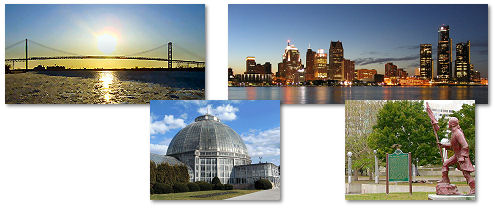
City Maps/Weather
| Fun City Facts Boeing's final assembly plant, the world's largest building, is located in Everett, Washington. The Mall of America in Bloomington, Minnesota is over 9.5 million square feet, or the size of 78 football fields. |
|
|
||||||||
Detroit, Michigan
City History |
||||||||
 Detroit is the largest city in the U.S. state of Michigan. It is known as the world's traditional automotive center "Detroit" stands for the United States automobile industry and an important source of popular music, legacies celebrated by the city's two familiar nicknames, Motor City and Motown. The city's name comes from the Detroit River. Traveling up the Detroit River on the ship Le Griffon, Father Louis Hennepin noted the north bank of the river as an ideal location for a settlement. There, in 1701, the French officer Antoine de la Mothe Cadillac founded a settlement called Fort Détroit. Francois Marie Picoté Belestre was the last French military commander at Fort Detroit, surrendering the fort on November 29, 1760 to the British. During the French and Indian War, British troops gained control and shortened the name to Detroit. Several tribes led by Chief Pontiac, an Ottawa leader, launched Pontiac's Rebellion, including a siege of Fort Detroit. Partially in response to this, the British Royal Proclamation of 1763, included restrictions in unceded Indian territories, Detroit passed to the United States under the Jay Treaty (1796). Tragically in 1805, fire destroyed most of the settlement. A river warehouse and brick chimneys of the wooden homes were the sole structures to survive. Detroit's many Gilded Age mansions and buildings arose during the late 1800s. The city was referred to as the "Paris of the West" for its architecture. Strategically located along the Great Lakes waterway, Detroit emerged as a transportation hub. The city had grown steadily from the 1830s with the rise of shipping, shipbuilding, and manufacturing industries. In 1896, a thriving carriage trade prompted Henry Ford to build his first automobile in a rented workshop on Mack Avenue, and in 1904, the Ford Motor Company was founded. Ford's manufacturing and those of automotive pioneers William C. Durant, the Dodge brothers, and Walter Chrysler reinforced Detroit's status as the world's automotive capital. In 1980, Detroit hosted the Republican National Convention which nominated Ronald Reagan to a successful bid for President of the United States. Four years later, the city again appeared on the national radar, but for unwanted reasons: rioting in the wake of the Detroit Tigers' World Series championship left three dead and millions of dollars in property damage. In the 1990's new downtown stadiums were constructed for the Detroit Tigers and Detroit Lions in 2000 and 2002, this put the Lions' home stadium in the city for the first time since 1974 which prompted many improvements to the downtown area, including the first portions of the Detroit River Walk were laid. This "New Detroit" is the mainstay in the city's earnest desire to reinvent its economic identity through tourism. |
Historic Figures
Henry Ford (1863 –1947)| Henry Ford (1863 –1947) | |
| Henry Ford was the founder of the Ford Motor Company and father of modern assembly lines used in mass production. His introduction of the Model T automobile revolutionized transportation and American industry, and Detroit with it. He was a productive inventor and was awarded 161 U.S. patents. As sole owner of the Ford Company he became one of the richest and best known people in the world. He is accredited with "Fordism", that is, the mass production of large numbers of inexpensive automobiles using the assembly line which could finish a car in 98 minutes, coupled with high wages for his workers, notably the $5.00 per day pay scale adopted in 1914. Ford, though not formally educated, had a global vision, with consumerism as the key to peace. Ford shunned greed and did not believe in accountants; he amassed one of the world's largest fortunes without ever having his company audited. The company's first audit occurred after Henry Ford II became head of the company. Henry Ford's intense commitment to lowering costs resulted in many technical and business innovations, including the franchise system that put a Ford dealership in every city in North America and in major cities on six other continents. Ford left most of his vast wealth to the Ford Foundation but arranged for his family to control the company permanently. | |
browse cities | search | get listed | spotlight | about us | contact us | policies | partners
Copyright ©2024 www.ByCityLight.com - Page Design by Erik Schubach and Tristan Chambers